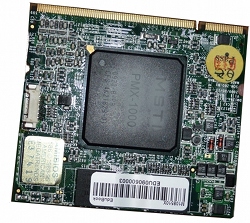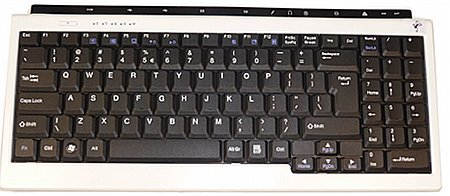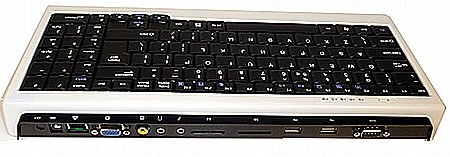PC fits into keyboard, uses only five Watts
Dec 17, 2009 — by LinuxDevices Staff — from the LinuxDevices Archive — 17 viewsThailand-based NorhTec announced a device touted as “the world's most energy-efficient desktop computer,” offered for only $99 with the Linux version. Built into a standard-sized keyboard, the “Gecko Surfboard” runs on a 1GHz x86 SoC (system on chip), operates fanlessly, and uses just five Watts, the company says.
NorhTec's Gecko Surfboard is an interesting follow-on to the Gecko EduBook, a $200 netbook announced in May, and the Gecko Infopad, a $300 tablet PC announced in September, both of which are said to be capable of running on AA batteries. Like these previous Geckos, the Surfboard uses the 1.0GHz Vortex86MX (also marketed as the MSTI PMX-1000) a SoC introduced by Taiwan-based DMP Electronics last December. (The Vortex86MX, pictured below, is related to DMP's earlier Vortex86DX, but adds integrated graphics and audio.)

NorhTec's Xcore86, pictured on the processor module used by the Gecko Infopad
(Click to enlarge)
NorhTec, which rebrands the Vortex86MX as the Xcore86, characterizes it as a "light-duty" processor, but says the SoC provides enough power to run Windows XP, Windows CE, or one of several different Linux distributions. The SoC runs fanlessly, and includes graphics and other typical northbridge/southbridge functions while using just five Watts, the company says.

NorhTec's Gecko Surfboard
(Click to enlarge)
While the Surfboard's weight and dimensions were not specified, NorhTec says the device (pictured above) is no larger or heavier than a standard keyboard. Given the Xcore86's relatively limited aspirations, the device is not marketed as a home theater component, but is said to make a "great thin client," and to be "ideal for bank tellers, reservation clerks, POS, home, schools, or hospitals."
Accordingly, the Surfboard does not include an HDMI output, but does include both VGA and composite video outputs, the latter allowing televisions to be used as low-cost displays when required. As the photo below shows, other ports on the device include a RJ45 connector for 10/100 Ethernet, a headphone jack, a microphone input, two USB 2.0 ports, and a serial port.

Rear of the Gecko Surfboard
(Click to enlarge)
NorhTec says the Gecko Surfboard also has two SD/SDHC slots, permitting the computer's primary storage to be solid-state. Alternatively, there's an IDE interface and room for a 2.5-inch hard disk drive inside the keyboard, according to the company.
Wireless networking does not come standard with the $99 price, but it's said the Gecko Surfboard can accommodate both 802.11b/g and 3G cellular modules. The computer has 512MB of DDR2 RAM, according to NorthTec, which did not cite any potential memory expansion.
Features and specifications listed by NorhTec for the Gecko Surfboard include:
- Processor — Xcore86 (Vortex86MX) SoC clocked at 1.0GHz
- Memory — 512MB of DDR2 RAM
- Storage — SD/SDHC card or IDE-interfaced 2.5-inch hard disk drive
- Display — VGA and composite video output (resolution not specified)
- Networking:
- LAN — 10/100 Ethernet
- WLAN — 802.11b/g (optional)
- WAN — 3G module (optional)
- Other I/O:
- 1 x VGA
- 1 x composite
- 2 x USB 2.0
- 1 x serial
- Audio — mic in and headphones out
- Power requirements — 12VDC via AC adapter (requires only 5 Watts)
- Dimensions — n/s, but no larger than standard keyboard
- Weight — n/s
- Operating system — Linux or Windows XP
The Gecko Surfboard
Source: NorhTec (click to play)
Availability
NorhTec did not specify precise availability but said the Gecko Surfboard will be introduced at next month's Consumer Electronics Show (CES) and go on sale subsequently. The device will cost approximately $99 with Linux and $150 with Windows XP, the company added.
The NorhTec website does not yet offer further information on the InfoPad, but more about the related Gecko EduBook may be found here.
This article was originally published on LinuxDevices.com and has been donated to the open source community by QuinStreet Inc. Please visit LinuxToday.com for up-to-date news and articles about Linux and open source.